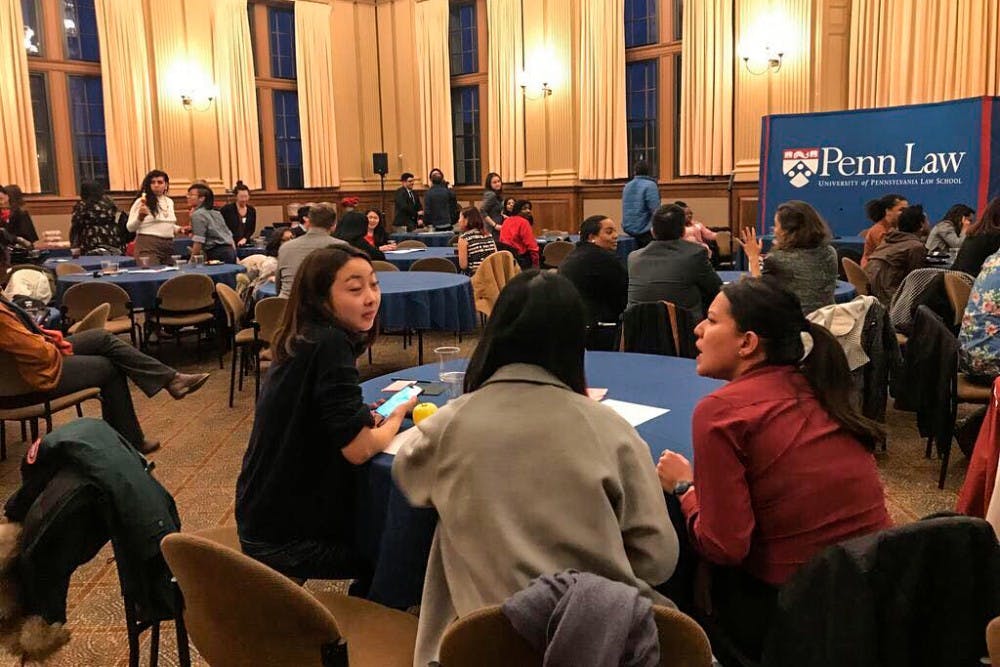
At the first annual community discussion for first-generation, low-income graduate students, panelists described their earliest memories as FGLI students and the challenges they faced in academics and being separated from their families.
More than five dozen students filled Penn Law’s Levy Conference Center for the dinner and discussion on March 28, which was hosted by Penn First Graduate Association. This gathering follows a year of unprecedented strides in FGLI graduate student advocacy. Graduate and Professional Student Assembly appointed its first ever FGLI deputy in August 2018. In the fall, the Penn First Graduate Association formed as an umbrella group under GAPSA for all FGLI graduate organizations.
The panel included professor of Pharmacology Arnaldo Díaz Vázquez, Director of Veterans Upward Bound at Penn Diane Sandefur, professor in the Higher Education Division Manuel González-Canché, and Associate Vice Provost William Gipson. The event, which included panelists answering questions about being FGLI throughout their lives, was a culmination of PFGA's work for the year, said GAPSA FGLI Deputy Jade Parker, who helped organize the event.
Díaz Vázquez, who grew up in and attended college in Puerto Rico, said he experienced immense stress over costs of transportation to go to university instead of going to trade school and supporting his family made him feel “awful.” These feelings of guilt were complicated by stress over poor performance upon entering college.
Sandefur decided to go to college after getting married and having two kids. She described the struggle of balancing work, school, and family.
“There was no social time,” Sandefur said. “I would never attend anything like [this event].”
González-Canché said he first became aware of being low-income during his time in a prestigious Mexican high school. His feelings of exclusion continued into college, where he said in Mexico, most people attending college are not FGLI.
The panelists described how being FGLI aids them in their current work and allows them to act as role models for students and family.
“Feel proud that you’re opening a path,” Díaz Vázquez said to the crowd of students, adding that he shares his story with others and helps students build networks.
The event ended with panelists talking about the misconception that FGLI students seek special treatment.
“I realize that there are super wealthy folks out there who are buying their children’s way into highly selective universities. We don’t have that opportunity nor would we want that opportunity," Sandefur said.
She added that FGLI students want to accomplish the work by their own merit instead of being treated differently than other people.
González-Canché added that whenever he got a job he thought people just gave it to him because he’s Mexican instead of because of his own work. While he believes more in himself now, he doesn’t think there’s anything wrong with getting extra support or attention for being FGLI.
“We left our families, we left everything to be here,” González-Canché said.
Angélica Gutiérrez, first year graduate student pursuing a masters degree in education, said seeing two Latino faculty on the panel was particularly important for her.
“Coming to a space like this it reminds you that you do belong here,” Gutiérrez said. “[The event] was a good grounding reminder that we are here because we deserve to be here. We are part of this bigger community.”
The presence of Latino faculty on the panel was also important for Biridiana Rodriguez, who received her master’s degree in Educational Policy in 2018. Rodriguez said that the event shows a greater commitment at Penn not just to recognize FGLI students, but students who are FGLI and identify as queer or as a person of color.
Parker said that she hopes attendees will get a sense of community from the event and be inspired to get involved with advocacy.
“We’re often siloed into our different programs and don’t have the time to come together,” Parker said. “I’m curious and excited to see where [FGLI graduate advocacy] goes.”
The Daily Pennsylvanian is an independent, student-run newspaper. Please consider making a donation to support the coverage that shapes the University. Your generosity ensures a future of strong journalism at Penn.
Donate



